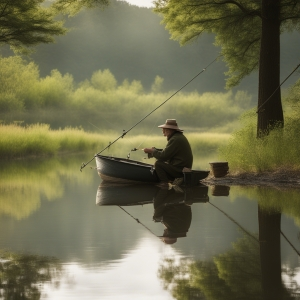Table of Contents:
Introduction: Discovering the Zen of Fishing
Have you ever wondered why the simple act of casting a line can bring such peace to your mind? This raw connection with nature, the patience required, the triumph of the catch – all these elements encompass the zen of fishing. In this article, we will explore how angling relates to mindfulness, and how you can incorporate it into your fishing routine for a more gratifying experience. You don't need to be a fishing aficionado to grasp the essence of this. Whether you're a seasoned angler seeking tranquillity or a beginner looking for a peaceful hobby, this journey will appeal to you.
Unpacking the Concept of Mindfulness
Mindfulness, in simple terms, means being fully present in the moment. It's about putting aside all distractions, both internal and external, and focusing on what you're doing right now. Instead of rehashing the past or worrying about the future, you are fully attuned to your current activity. When applied to fishing, mindfulness transforms it from a simple hobby into a deeply contemplative and restorative experience.
The Pros and Cons of Mindful Fishing
| Pros | Cons |
|---|---|
| Improves Patience | May require initial learning curve |
| Encourages presence | Possible negative weather conditions |
| Connects with nature | Potential harm to wildlife if not responsible |
| Can be meditative and relaxing | Potential for disappointment if no fish are caught |
| Improves concentration | Requires time and commitment |
How Fishing Cultivates Mindfulness

The act of fishing draws us into a mindful state almost effortlessly. Whether it's the gentle lapping of the water against the shore, the rhythmic movement of casting, or the patient wait for a nibble, it's easy to find yourself in the moment. Fishing requires focus and patience, making it an ideal way to clear the clutter of daily life from your mind.
Think about it - when you're fishing, your attention is placed in one spot. This concentration on one task is a form of active meditation and mindfulness. You're not fixating on your work, chores, or other worries. Instead, you're absorbed in the here and now, attuned to the subtle changes in the environment and the signalling tug on the line.
Moreover, the thrill of a possible catch often creates a sense of anticipation. This anticipation doesn't stress you out. It excites you, brings you joy and keeps you alert. That’s why every mindful angler understands that the catch is the bonus, not the objective. The true reward is the calmness and peace of mind achieved through steadfast presence.
The Meditative Nature of Fishing
Why is fishing considered a meditative activity? The answer lies in the various aspects of angling that promote a tranquil state of mind. When fishing, you are in a natural setting, away from the hustle and bustle of everyday life. The serene landscape, the gentle waves, and the rhythmic casting and reeling provide a soothing backdrop conducive to meditation.
Beyond the physical actions, there's a significant amount of waiting in fishing. This waiting period is an opportunity to let your thoughts flow freely, much like in meditation. Rather than being idle time, it's an essential part of the experience that enables you to access your inner calm and heighten your awareness.
As you immerse yourself in the act of fishing, you naturally create a mental distance from your stressors, allowing your mind to rest and rejuvenate. This meditative state is where fishing ties in with the practice of mindfulness. Through fishing, we learn the art of being present, letting go, patiently waiting, and appreciating the experience for its own sake, regardless of whether we catch a fish or not.
Integrating Mindfulness into Your Fishing Routine

With a basic understanding of mindfulness, let's delve into how you can weave it into your fishing routine for a peaceful, rewarding experience. Start by leaving all distractions behind when heading out for a fishing trip. Unplug from your devices and allow yourself to be fully present. Every element of fishing - be it the setting of the hook, casting the line, or the thrill of a bite, can be a mindful exercise if you're attentive and immersed in the process.
Next, tune into your senses as you fish. Observe the landscape, listen to the sounds of nature, feel the rod and reel in your hands, smell the water and fresh air. By engaging all your senses, you create a vibrant, immediate connection with what you're doing and where you are.
Remember, mindfulness isn't about achieving a blank mind; it's about cultivating awareness. While waiting for a catch, let your thoughts come and go without judgement. This practice guides you to accept things as they are, including your thoughts and feelings, without trying to change or resist them.
Lastly, perceive every part of your fishing experience as equally important. Don’t focus only on getting a catch. The whole process – preparing your gear, choosing a fishing spot, casting your line, and waiting patiently – is as rewarding as the catch itself. This shift in perspective invites you to savour every moment and find joy in the journey, redefining your definition of success in fishing.
Fishing: A Soulful Connection with Nature
Fishing takes you into the heart of nature. As an angler, you find yourself away from the rush of the cities, immersed in a calm and serene environment. Lakes, rivers, or the open sea - these places are sanctuaries of peace and tranquillity. You breathe in fresh air, listen to the melody of birds, and take in the sun setting over the water. It's raw, it's beautiful, and it's calming.
Beyond offering scenic beauty, nature gives us a quiet space to be with our thoughts. It provides the perfect setting for solitude and introspection. And the activity of fishing complements this perfectly. You're part of nature during this time, quietly co-existing and respecting its resources. You're not just trying to catch a fish; you're also catching moments of silence and peace.
This deep connection with nature and the tranquillity it offers are much needed in today's fast-paced life. They help to soothe your mind, relieve stress, and bring a sense of calmness. Fishing isn't just another outdoor activity; it's a way to reconnect with our natural roots. It's a form of meditation, a path towards mindfulness. And what's more, you're nurturing this connection in the most gentle manner possible - by simply being in nature and appreciating its serenity. So the next time you go fishing, pause and look around. Feel the wind, listen to the rustle of leaves or the lapping of water, and truly soak in the beauty of nature. Remember, it's not just about catching fish; it's about catching a break - a break from stress, and a break for your soul.
The Psychological Benefits of Fishing

Fishing is more than just a leisure activity, it's a form of therapy. It provides significant psychological benefits, contributing to our overall mental health. Let's analyze how this seemingly simple outdoor activity boosts our psychological well-being.
Firstly, fishing is a great stress buster. Surrounded by nature, away from the noise of the city, fishing offers a sense of serenity and peace. Just being near water can soothe the mind, while the rhythmic actions involved in fishing help to calm the senses.
Secondly, fishing is a wonderful way to increase our focus and concentration. It requires keen observation and precision, which means we have to be completely involved and present in the activity. Through this deep immersion, fishing trains our mind to concentrate and sharpens our attention.
Thirdly, fishing encourages patience and perseverance. It often involves long periods of waiting, teaching us to be patient and keep our hopes high. Even when we don’t catch anything, we learn to handle disappointments gracefully and keep at it until we succeed. The intrinsic value of resilience that fishing instills is truly invaluable.
Learning and incorporating mindfulness during fishing also contributes to the development of a positive attitude. As we hone our fishing skills, we gain a sense of accomplishment, enhancing our self-esteem and fostering a positive self-image. Fishing, in essence, promotes a healthy mindset, making us the masters of our thoughts and emotions.
In summary, fishing's psychological benefits extend beyond immediate enjoyment. They permeate into our daily life, making us more focused, patient, and resilient. It shapes us into being more mindful and appreciative of the present moment – the true essence of living.
Embracing Patience through Fishing
When we talk about patience and fishing, they often go hand in hand. The very act of fishing involves a lot of waiting. We cast the line and wait for the fish to bite. This waiting period is not idle time, it's time for reflection and acceptance of the flow of nature.
Patience in fishing takes on a meditative quality. It's not about rushing to catch a fish but waiting for the right moment. This act of patience does more than just contribute to the catch. It teaches us a valuable lesson applicable even in our daily life - dealing with uncertainty with composure.
Each time you cast your fishing line, think of it as a reminder to slow down and be patient. Enjoy the anticipation, and remember - it's not always about the catch. Embracing this mindset will not only enhance your fishing experience but also cultivate a healthy approach to life's daily challenges.
By instilling patience, fishing provides a profound, meaningful experience, reinforcing the connection between angling and mindfulness. The next time you go fishing, take a moment to appreciate this gift of patience and see how it transforms your overall experience.
Conclusion: How Fishing Can Enhance Your Life
In summary, fishing is much more than just an outdoor activity or a sport - it is a delicate route to mindfulness. By learning to immerse yourself fully into each moment of your fishing experience, you open up a world of tranquility, awareness, and gratification. Not only does this provide a pleasant escape from our daily grind, it also improves your attentiveness and reduces stress levels.
Embracing the zen of fishing isn't about becoming an expert angler, but deriving pleasure from the simple acts: the cast, the wait, the tug, and even the release. So the next time you gear up for a fishing outing, remember to slow down, stay present, and savour the experience. Let it not just be about chasing a catch, but about seeking inner peace, clarity, and tranquility. In this way, you'll find fishing to not just be an enriching hobby, but a truly life-enhancing practice.
FAQ: The Mindful Art of Fishing
What is 'mindful' fishing?
Mindful fishing is the practice of being fully present and engaged in the fishing process, with a focus on enjoying the experience rather than just the outcome.
How does fishing relate to mindfulness?
Fishing requires patience, focus, and an awareness of your surroundings. These are all key components of mindfulness. By focusing on the act of fishing, you can quiet your mind and achieve a state of calm and relaxation.
What benefits can mindful fishing bring?
Mindful fishing can reduce stress, increase your appreciation for nature, and help you develop patience and focus. It provides a break from the usual hustle and bustle, allowing you to enjoy the simple act of fishing.
How do I practice mindful fishing?
Start by setting an intention to focus on the process and not just the catch. Pay attention to your surroundings, the sensations of fishing, and let go of distracting thoughts as they arise.
Do I need any special equipment for mindful fishing?
No special equipment is needed for mindful fishing. The important thing is your mindset and intention rather than the gear you use.







